《新编英语教程》第三册课文及翻译
- 格式:docx
- 大小:58.16 KB
- 文档页数:20
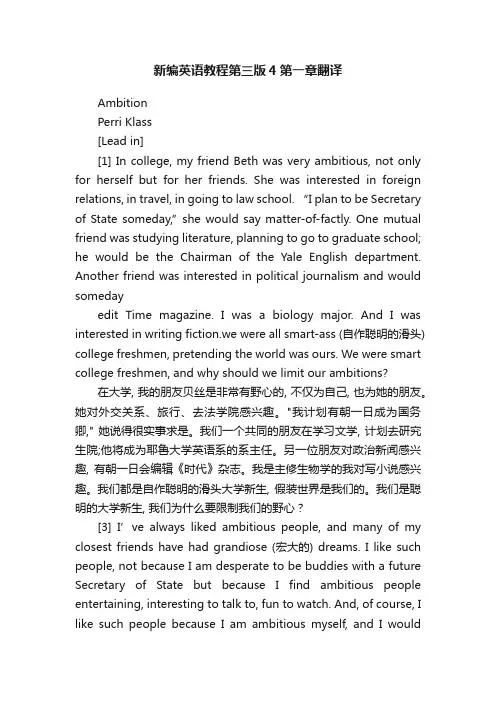
新编英语教程第三版4第一章翻译AmbitionPerri Klass[Lead in][1] In college, my friend Beth was very ambitious, not only for herself but for her friends. She was interested in foreign relations, in travel, in going to law school. “I plan to be Secretary of State someday,”she would say matter-of-factly. One mutual friend was studying literature, planning to go to graduate school; he would be the Chairman of the Yale English department. Another friend was interested in political journalism and would somedayedit Time magazine. I was a biology major. And I was interested in writing fiction.we were all smart-ass (自作聪明的滑头) college freshmen, pretending the world was ours. We were smart college freshmen, and why should we limit our ambitions?在大学, 我的朋友贝丝是非常有野心的, 不仅为自己, 也为她的朋友。
她对外交关系、旅行、去法学院感兴趣。
"我计划有朝一日成为国务卿," 她说得很实事求是。
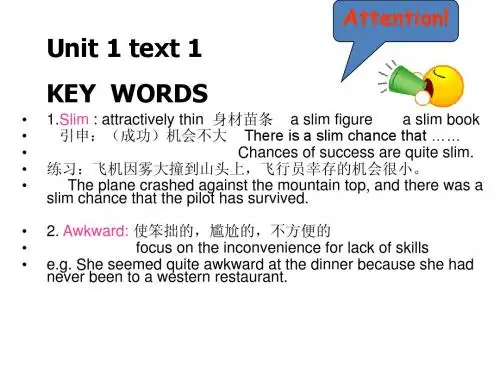
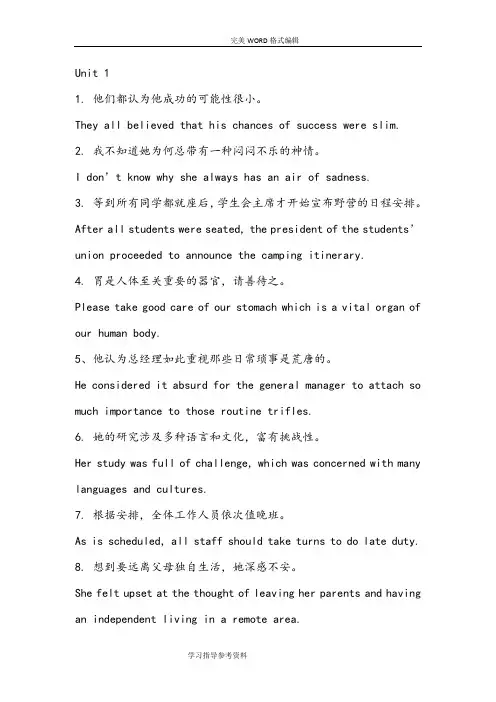
Unit 11. 他们都认为他成功的可能性很小。
They all believed that his chances of success were slim.2. 我不知道她为何总带有一种闷闷不乐的神情。
I don’t know why she always has an air of sadness.3. 等到所有同学都就座后,学生会主席才开始宣布野营的日程安排。
After all students were seated, the president of the students’ union proceeded to announce the camping itinerary.4. 胃是人体至关重要的器官,请善待之。
Please take good care of our stomach which is a vital organ of our human body.5、他认为总经理如此重视那些日常琐事是荒唐的。
He considered it absurd for the general manager to attach so much importance to those routine trifles.6. 她的研究涉及多种语言和文化,富有挑战性。
Her study was full of challenge, which was concerned with many languages and cultures.7. 根据安排,全体工作人员依次值晚班。
As is scheduled, all staff should take turns to do late duty.8. 想到要远离父母独自生活,她深感不安。
She felt upset at the thought of leaving her parents and having an independent living in a remote area.9. 对于她是否胜任这份工作我们不甚担心,我们所担忧的却是她的健康状况。

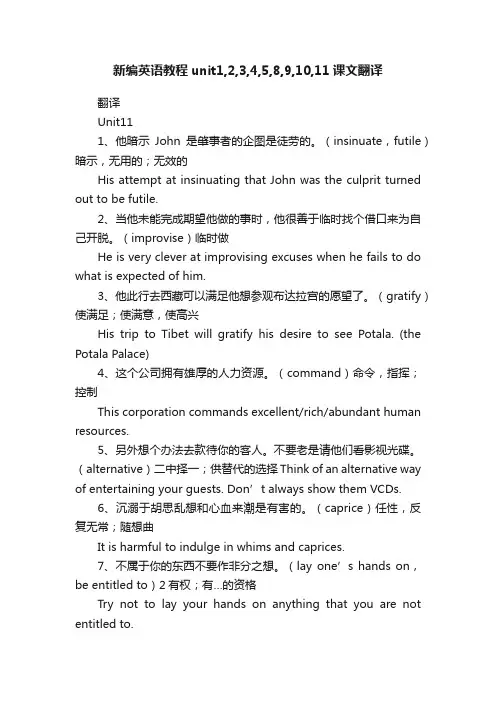
新编英语教程unit1,2,3,4,5,8,9,10,11课文翻译翻译Unit111、他暗示John是肇事者的企图是徒劳的。
(insinuate,futile)暗示,无用的;无效的His attempt at insinuating that John was the culprit turned out to be futile.2、当他未能完成期望他做的事时,他很善于临时找个借口来为自己开脱。
(improvise)临时做He is very clever at improvising excuses when he fails to do what is expected of him.3、他此行去西藏可以满足他想参观布达拉宫的愿望了。
(gratify)使满足;使满意,使高兴His trip to Tibet will gratify his desire to see Potala. (the Potala Palace)4、这个公司拥有雄厚的人力资源。
(command)命令,指挥;控制This corporation commands excellent/rich/abundant human resources.5、另外想个办法去款待你的客人。
不要老是请他们看影视光碟。
(alternative)二中择一;供替代的选择Think of an alternative way of entertaining your guests. Don’t always show them VCDs.6、沉溺于胡思乱想和心血来潮是有害的。
(caprice)任性,反复无常;随想曲It is harmful to indulge in whims and caprices.7、不属于你的东西不要作非分之想。
(lay one’s hands on,be entitled to)2有权;有…的资格Try not to lay your hands on anything that you are not entitled to.8、他没有来参加竞赛。
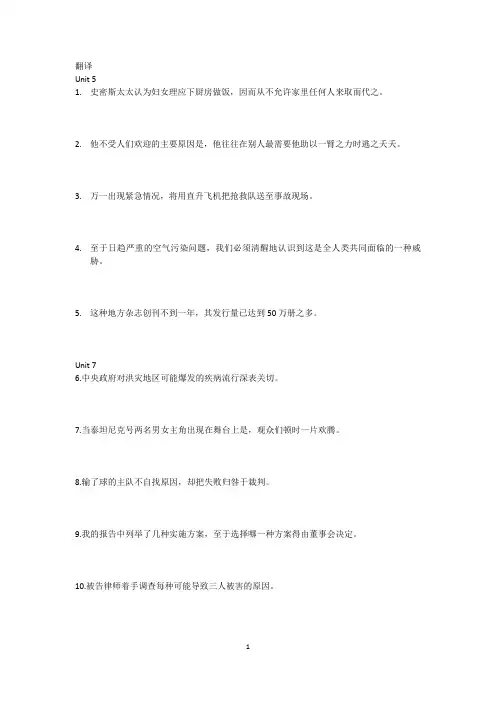
Unit 5
1.史密斯太太认为妇女理应下厨房做饭,因而从不允许家里任何人来取而代之。
2.他不受人们欢迎的主要原因是,他往往在别人最需要他助以一臂之力时逃之夭夭。
3.万一出现紧急情况,将用直升飞机把抢救队送至事故现场。
4.至于日趋严重的空气污染问题,我们必须清醒地认识到这是全人类共同面临的一种威
胁。
5.这种地方杂志创刊不到一年,其发行量已达到50万册之多。
Unit 7
6.中央政府对洪灾地区可能爆发的疾病流行深表关切。
7.当泰坦尼克号两名男女主角出现在舞台上是,观众们顿时一片欢腾。
8.输了球的主队不自找原因,却把失败归咎于裁判。
9.我的报告中列举了几种实施方案,至于选择哪一种方案得由董事会决定。
10.被告律师着手调查每种可能导致三人被害的原因。
6这么多年轻人守候在窗外,为抢救这孩子的生命而随时准备为他输血,这是我深为感动。
7上星期下了一场大雪,接连好几天都很潮湿
8虽然他极力解释他的计划,他们仍然对这个计划的可行性持怀疑态度
9校方对这些学生进行了惩处,因为他们在课堂上侮辱那个年轻的代课老师。
10 她说话的声音明显带有一丝嫉妒。
Unit 10
1. 那个小女孩在轰炸中存活下来确实是一个奇迹。
2. 把这辆车作为我的生日礼物说明我姑母的爱心和慷慨。
3. 人们喜欢到那家饭店吃午饭是因为那里的菜肴既丰富又可口。
4. 英国的首相和美国的总统在职位方面并非完全相对应。
5. 我悄悄地走近他们,从树枝中偷看,只见他们正在愉快地享用野餐。
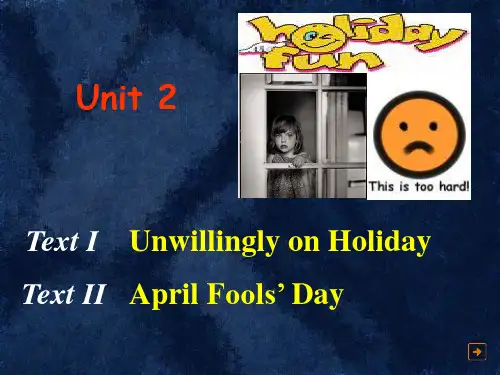
![新编英语教程第三册unit1[1]](https://uimg.taocdn.com/899c26150029bd64793e2c00.webp)
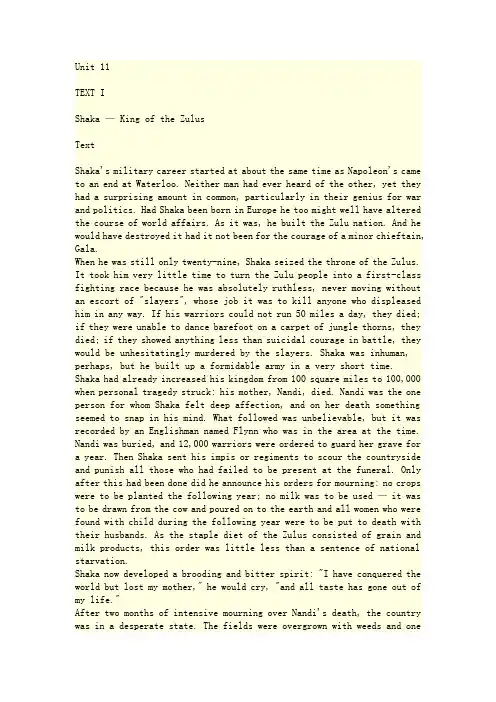
Unit 11TEXT IShaka — King of the ZulusTextShaka's military career started at about the same time as Napoleon's came to an end at Waterloo. Neither man had ever heard of the other, yet they had a surprising amount in common, particularly in their genius for war and politics. Had Shaka been born in Europe he too might well have altered the course of world affairs. As it was, he built the Zulu nation. And he would have destroyed it had it not been for the courage of a minor chieftain, Gala.When he was still only twenty-nine, Shaka seized the throne of the Zulus. It took him very little time to turn the Zulu people into a first-class fighting race because he was absolutely ruthless, never moving without an escort of "slayers", whose job it was to kill anyone who displeased him in any way. If his warriors could not run 50 miles a day, they died; if they were unable to dance barefoot on a carpet of jungle thorns, they died; if they showed anything less than suicidal courage in battle, they would be unhesitatingly murdered by the slayers. Shaka was inhuman, perhaps, but he built up a formidable army in a very short time. Shaka had already increased his kingdom from 100 square miles to 100,000 when personal tragedy struck: his mother, Nandi, died. Nandi was the one person for whom Shaka felt deep affection, and on her death something seemed to snap in his mind. What followed was unbelievable, but it was recorded by an Englishman named Flynn who was in the area at the time. Nandi was buried, and 12,000 warriors were ordered to guard her grave for a year. Then Shaka sent his impis or regiments to scour the countryside and punish all those who had failed to be present at the funeral. Only after this had been done did he announce his orders for mourning: no crops were to be planted the following year; no milk was to be used — it was to be drawn from the cow and poured on to the earth and all women who were found with child during the following year were to be put to death with their husbands. As the staple diet of the Zulus consisted of grain and milk products, this order was little less than a sentence of national starvation.Shaka now developed a brooding and bitter spirit: "I have conquered the world but lost my mother," he would cry, "and all taste has gone out of my life."After two months of intensive mourning over Nandi's death, the country was in a desperate state. The fields were overgrown with weeds and oneof the staple diets, namely milk, was no longer on the food list. Total ruin now faced the Zulu nation, and it was obvious that those who had not been killed by Shaka would certainly starve to death.Finally, one of Shaka's warriors, Gala, determined to end the tyranny. "It is enough," he told his family. "Someone must tell the Great Elephant.I shall do it. " Gala's family stared at him in horror: to challenge the King's wishes at such a moment was to ask for instant death. But Gala took his warrior's stick and went to Bulawayo to see Shaka. When he reached the right distance from the royal enclosure he shouted: "O King, you have destroyed your country. What will you reign over? Will you create a new race? Shall we all die because your mother died? You have destroyed the country. Your country will be inhabited by other kings, for your people will die of hunger. As for me, O King, I say you are dead yourself through this mother of yours. Stuff a stone into your stomach. This is not the first time anyone has died in Zululand!"Stuff a stone into your stomach! This was the Zulu way of saying: "pull yourself together". There was a gasp of horror from the onlookers, and the slayers took a grip on their clubs. That a man should dare to speak to the King in such a way was unthinkable, and Gala's life seemed to be measured in seconds. But Shaka turned to his Councillors and said: "What use are you to me? You never dared, like Gala, to tell me to stuff a stone in my stomach. Now let all men know that crops are to be planted as usual and that milk may be drunk again. And as for you," said Shaka, turning to Gala, "you shall have a mighty gift of many cattle."From an article in Look and LearnTEXT IIThe Stamping of the ThornsShaka's particular genius lay in his great personal attention to detail and in his capacity for hard work. If at all possible, he always insisted on inspecting everything himself, and he invariably checked all reports by getting evidence from as many sources as possible. He was a firm believer in the saying: "It is the master's eye which makes the cow grow fat."Two months after becoming king, Shaka called all his "regiments" together. His combined fighting forces totalled only about 500 men. He told them of the virtues of the short, heavy stabbing spear or assegai which he himself had designed to replace the light throwing one used in the past by the Zulu fighters. As he expected, the younger soldiers took up the new assegai with enthusiasm, soon to be followed by the older men. Next Shaka ordered all his regiments to throw away their sandals. There was considerable protest at this, especially from the older groups, buthe pointed to his own bare feet and even ran a race to prove that he was faster than any of his men wearing sandals.A month later, Shaka noticed that there was still a lot of dissatisfaction and grumbling about his order that sandals should no longer be worn. So, he told one of his regiments to collect many basketfuls of the sharp "devil thorns". These thorns have three spikes, one of which always points upwards when they lie on the ground.When enough of these thorns had been collected, Shaka ordered them to be spread over the parade ground. All his regiments were then ordered to parade a little to the side of the ground covered with thorns. Shaka then addressed them: "It has come to my ears," he said, "that some of you have soft feet, and this has made me very sad. So I have decided to help you harden them!"Shaka then ordered his men to stamp the thorns into the ground with their bare feet. Anyone who hesitated or did not stamp hard enough was to be killed at once by his "slayers".The regiments gritted their teeth and, led by Shaka himself, spread over the parade ground. Shaka turned to face them and the stamping began. Shaka's feet, however, were horny and impervious. He felt nothing; but his eagle eye at once picked out those who were hesitant. These men were told to stand forward and were then clubbed to death by the slayers. And so he went on, searching up and down the lines, but after half a dozen examples had been made all the soldiers stamped as hard as they could. When Shaka was satisfied that the thorns had been stamped out of sight he told his men they could go. That evening they were given a great feast at which they could eat and drink as much as they liked.From Shaka Zulu by E. A. Ritter。

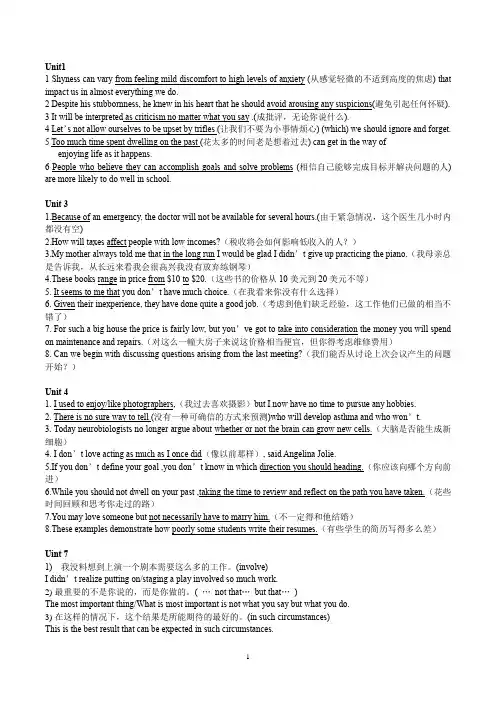
Unit11 Shyness can vary from feeling mild discomfort to high levels of anxiety (从感觉轻微的不适到高度的焦虑) that impact us in almost everything we do.2 Despite his stubbornness, he knew in his heart that he should avoid arousing any suspicions(避免引起任何怀疑).3 It will be interpreted as criticism no matter what you say .(成批评,无论你说什么).4 Let’s not allow ourselves to be upset by trifles (让我们不要为小事情烦心) (which) we should ignore and forget.5 Too much time spent dwelling on the past (花太多的时间老是想着过去) can get in the way ofenjoying life as it happens.6 People who believe they can accomplish goals and solve problems (相信自己能够完成目标并解决问题的人) are more likely to do well in school.Unit 31.Because of an emergency, the doctor will not be available for several hours.(由于紧急情况,这个医生几小时内都没有空)2.How will taxes affect people with low incomes?(税收将会如何影响低收入的人?)3.My mother always told me that in the long run I would be glad I didn’t give up practicing the piano.(我母亲总是告诉我,从长远来看我会很高兴我没有放弃练钢琴)4.These books range in price from $10 to $20.(这些书的价格从10美元到20美元不等)5. It seems to me that you don’t have much choice.(在我看来你没有什么选择)6. Given their inexperience, they have done quite a good job.(考虑到他们缺乏经验,这工作他们已做的相当不错了)7. For such a big house the price is fairly low, but you’ve got to take into consideration the money you will spend on maintenance and repairs.(对这么一幢大房子来说这价格相当便宜,但你得考虑维修费用)8. Can we begin with discussing questions arising from the last meeting?(我们能否从讨论上次会议产生的问题开始?)Unit 41. I used to enjoy/like photographers,(我过去喜欢摄影)but I now have no time to pursue any hobbies.2. There is no sure way to tell (没有一种可确信的方式来预测)who will develop asthma and who won’t.3. Today neurobiologists no longer argue about whether or not the brain can grow new cells.(大脑是否能生成新细胞)4. I don’t love acting as much as I once did(像以前那样), said Angelina Jolie.5.If you don’t define your goal ,you don’t know in which direction you should heading.(你应该向哪个方向前进)6.While you should not dwell on your past ,taking the time to review and reflect on the path you have taken.(花些时间回顾和思考你走过的路)7.You may love someone but not necessarily have to marry him.(不一定得和他结婚)8.These examples demonstrate how poorly some students write their resumes.(有些学生的简历写得多么差)Uint 71) 我没料想到上演一个剧本需要这么多的工作。
新编大学基础英语综合教程3课后翻译我们信任他,因为他总是说话算话的。
We believe in him because he is always true to his word. 她选择了冬天休假而不是夏天。
She has opted of a winter vacation,instead of one in the summer. 在那次政治集会上,记着的数量超过了来宾。
Reporters outnumbered guests at the political gathering.尽管有暴风雨,他们还是冒险驾车赶路。
they took a risk in driving on,in spite of the storm. 开车时驾驶员要把注意力集中在道路上。
A driver should concentrate his attention on the road when driving,我正在等一个很重要的电话。
I am waiting for an important phone call.我今晚不能去看电影了,因为我把票弄丢了。
I can’t go to see the film tonight because I have lost my tideland.我已经等了一个小时了,可他还是没有来。
I have been waiting for an hour, but he still has’t turned up?你今晚要与比尔见面吗?Are you meeting Bill this evening?自从我搬到这里来就没有见过她。
I haven’t seen her since I moved here.下雨中断了我们的棒球比赛.The rain interrupted our baseball game.我们继续?你所有的朋友都会支持你的。
Shall we go on? All of your friends will stand up for you.恶习难改。
Unit 1Put in Use : Practice 1Unit 11.她一家商店一家商店的看,最后以她能付出的价格买了她所需要的东西。
She shopped around till she got what she wanted at a price she could afford.2.除了向我要东西,他从不跟我说话。
He never speaks to me other than to ask for something.3.你永远应该以搞好你的工作为目的。
Y ou should always aim at doing your job well.4.几个星期来她一直呆在家中照顾有病的父亲。
She has been tied to the house for weeks looking after her invalid father.5.修建这条路是为了缓解交通拥挤。
The route was designed to relieve traffic congestion.6.社会是由形形色色的人组成的。
有些人很好,有些人很坏,也有些人介乎两者之间。
Society is made up of a wide variety of people; some are good, others (are) bad, and still others (are) in between.Unit 251.这个星期你每天都迟到,对此你如何解释?How do you account for the fact that you've been late every day this week?2.政府已经承诺改善落后地区人民的生活条件。
The government has committed itself to improving the life conditions of the people living in the underdeveloped areas.3.据最新报道,这次火车交通事故造成多名乘客死亡。
1. 他们都认为他成功的可能性很小。
They all believed that he had a slim chance of success.2. 我不知道她为何总带有一种闷闷不乐的神情。
I don’t know why she has an air of sadness all the time.3. 等到所有同学都就座后,学生会主席才开始宣布野营的日程安排。
It was after all the students had taken their seats that the president of the students’union proceeded to announce the camping itinerary.4. 胃是人体至关重要的器官,请善待之。
The stomach is a vital organ of the human body; please take good care of it.5. 他认为总经理如此重视那些日常琐事是荒唐的。
He considered it ridiculous for the general manager to attach so much importance to those routine trifles.6. 她的研究涉及到多种语言和文化,富有挑战性。
Her study, which ranged over many languages and cultures, was full of challenge. 7. 根据安排,全体工作人员轮流值晚班。
As is scheduled, all the members of the staff take turns to do late duty.8. 想到要远离父母独立生活,她深感不安。
She was greatly upset at the thought of leaving her parents and living on her own ina remote area.9. 对于她是否胜任这项工作我们不甚担心,我们担心的是她的健康问题。
A Winter to Remember难忘的冬天Robert Best罗伯特.贝斯特①According to the weather men last winter was one of the worst in living memory.①气象员说,去年冬天是记忆中最冷的一个冬天。
①We live in the depths of the country, and my whole family agree that it was certainly a winter we shall never forget. ②Snow began to fall at round about thebeginning of the New Year and①我们生活在偏远地区;我们全家人都认为去年冬天肯定是我们永远无法忘记的。
②雪在年初开始下,断断续续下了十来天。
①At first we were all thrilled to see it.②It fell silently and relentlessly in large soft flakes until every ugly patch and corner of our rather rambling garden was smoothed over and had become a spotless white canopy.③The children soon spoiltleaving their footprints all over it.④Hungryon its surface.⑤It was now, when the garden was all churned up and of a dirty grey colour, that a severe frost set in, hardening the snow into ugly lumps of grimy concrete.⑥For the next three months the whole countryside lay in a grip of iron.①看见这样的情形,我们一开始都很兴奋。
②雪花很大很软,悄无声息,下个不停,最后我们家的那个布局很不规则的花园的每片土地上都蒙上了厚厚的一层雪,就像是一席洁白无瑕的罩蓬。
③但是,孩子们打雪仗,雪地上满是脚印,很快就破坏了这种美景。
④觅食的小鸟在雪地上也留下了纤细的爪痕。
⑤只有在花园被彻底翻腾过,呈现出肮脏的灰色后,严寒才会到来,把雪硬化成块,就像灰色的混凝土一样难看。
⑥在接下来的三个月里,整个乡村都陷入了冰天雪地。
①Every day the birds grew tamer, often waiting hopefully almost on our backdoor step.②We fed them with bits of cheese, chopped up meat and any leftovers we had.③We also put out bowls of water, which unfortunately within an hour had frozen solid.①小鸟变得更加驯服,常常在我们家后门的台阶上满怀希望地等待。
②我们用碎奶酪喂它们,我们还把肉和其他剩余食物切碎喂它们。
③还端出几碗水给它们喝,只可惜不到一个小时,就冻得结结实实。
of the rooms. ④As a result the water pipes froze so that for several weeks our water supply had to be brought in buckets from a nearby farm. ⑤We tried to buy a number of oil-stoves to keep these rooms warm, but other people had thought of doing thistoo —whenspring —which, of course, was a great comfort.①室内也非常冷。
②我们的中央供热系统很糟糕,很“不合作”:之所以说很糟糕,部分原因是系统需要全面检修,部分原因是门窗状况很糟,使得风嗖嗖地往室内钻;之所以说很“不合作”,是因为系统偶尔会“罢工”。
③更糟的是,许多房间的砖结构上有很多小孔,结果水管冻住了,以至于有几个星期我们的供水就是靠从附近的一家农场一桶又一桶地往家里提水。
④为了给房间取暖,我们想法设法去买一些油炉,但是别人也想到了这一点——我们到村里的商店买油炉时,店主告诉我们已经卖完了,虽然也有订货,但是要等到明年春天才能送到———很显然,这也是一个很大的“安慰”。
①Throughout January and February and much of March we sat about in ourovercoats andof water.①在整个一月和二月,以及三月的很长时间里,我们的取暖方式就是坐着的时候穿着棉大衣;另外的就是拖着沉重的脚步,来往于农场和屋舍之间,一桶接一桶地提水。
①On one occasion the water actually froze before it reached the house, and ouryoungest son — not the most intelligent of youth —①有一次,水还没有到家就已经冻住了,而我最小的儿子——他在同龄人中不是最聪明的——居然又原路返回把水送回了农场。
①However, one good thing did happen. ②One of the children dropped a container with a dozen eggs in it. ③I stooped down furiously to pick up what I thought would be the messy remains only to discover the eggs had come to no harm — they were as solid as if they had been hard-boiled.①不管怎样,还是发生了一件让人高兴的事。
②我的一个孩子把一个装有一打鸡蛋的容器掉在地上。
③我原以为那些鸡蛋已经摔成了稀烂,很生气,但是蹲下去捡时,却发现鸡蛋完好无损——原来那些鸡蛋已经冻得非常结实,像煮熟了一样。
①Late in March, it finally thawed. ②Water squirted from pipes in at least half a dozen places. ③Instead of carting buckets of water into the kitchen from the farm we now brought them in from different parts of the house. ④Eventually we found a plumber. ⑤The plumber undoubtedly saved us from drowning. ⑥I have been devoted to plumbers ever since.①三月底的时候,冰雪终于融化了(或译为:天终于回暖了)。
②我们家的水管至少有六个地方漏水,我们只能在漏水的地方接水,再也不用一桶接一桶地从农场往厨房里提水了。
③最后,我们找到一个管子工,他帮助我们免除了被淹死的危险,所以从那以后,我都一直都非常感激管子工。
结束Unit 13 [见教材P157]Christmas圣诞节Floyd Dell (the U.S.)弗洛依德. 戴尔(美国)①That fall, before it was discovered that the soles of both my shoes were worn clear through, I still went to Sunday school. ②And one time the Sunday-school superintendent made a speech to all the classes. ③He said that these were hard times, and that many poor children weren’t getting enough to eat. ④It was the first timethat I had heard about it. ⑤He asked everybody to bring some food for the poor children next Sunday. ⑥I felt very sorry for the poor children.①那年秋天,我一直在主日学校学习,直到发现我两只鞋的底子彻底磨烂。
②有一次,主日学校的校长对所有班级的学生讲话,他说现在是困难时期,许多贫困的孩子得不到足够的食物。
③那是我第一次听到这样的事情,他要求每一个学生下个礼拜日再来上学时,给那些贫困的孩子们带些食物。
④我非常同情那些孩子。
①Also, little envelopes were distributed to all the classes. ②Each little boy and girl was to bring money for the poor, next Sunday. ③The pretty Sunday-school teacher explained that we were to write our names, or have our parents write them, up in the left-hand corner of the little envelopes. ... ④I told my mother all about it when I came home. ⑤And my mother gave me, the next Sunday, a small bag of potatoes to carry to Sunday school. ⑥I supposed t he poor children’s mothers would make potato soup out of them. ... ⑦Potato soup was good. ⑧My father, who was quite a joker, would always say, as if he were surprised, “Ah! I see we have some nourishing potato soup today!”⑨It was so good that we had it every day. ⑩My father;and I liked that. ⑾too;the others were away. ⑿My oldest brother was in Quincy, and memory does not reveal where the others were: perhaps with relatives in the country.①另外,给所有班的学生都分发了小信封,要所有小朋友下个礼拜日再来上学时给那些贫困的孩子带些钱。